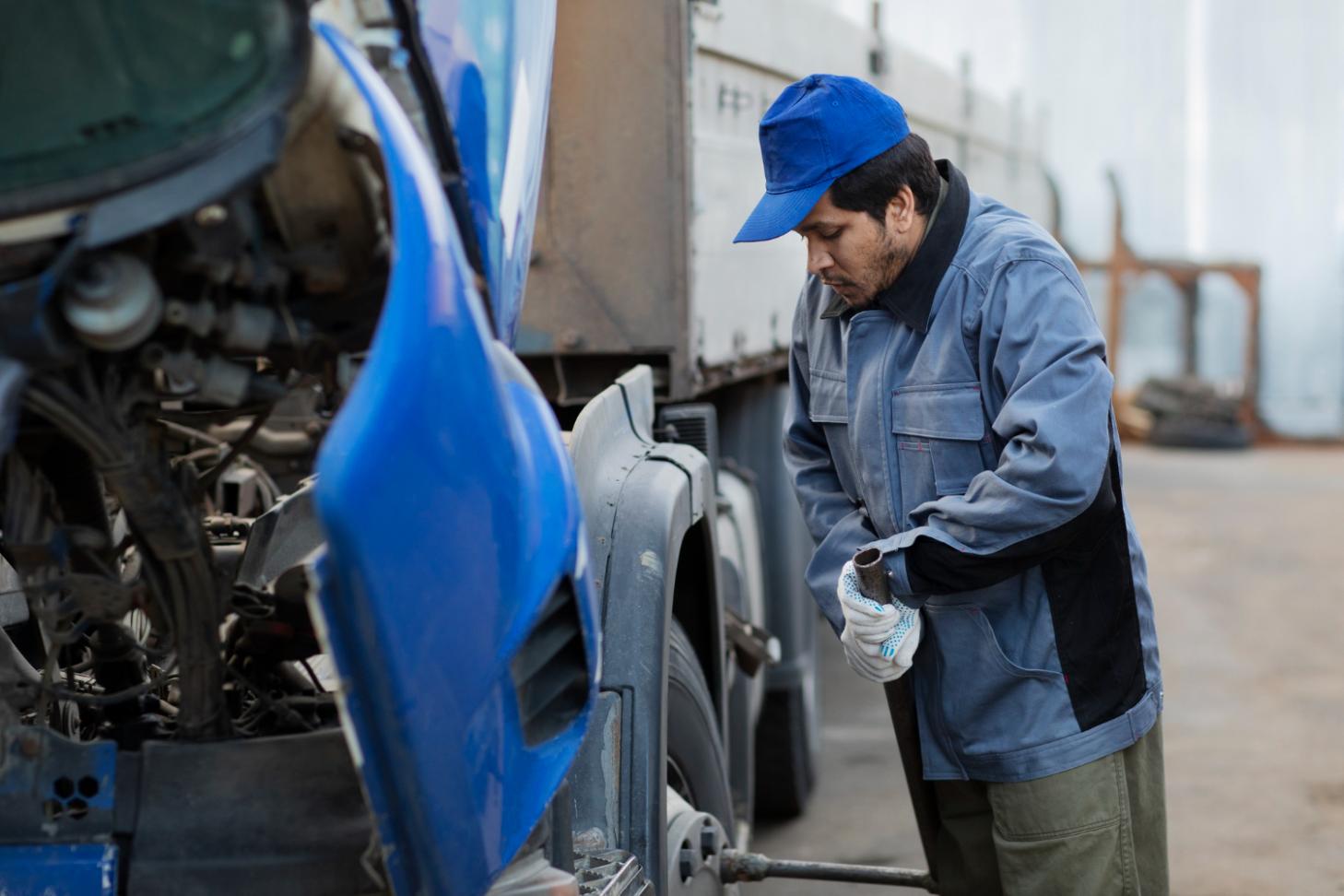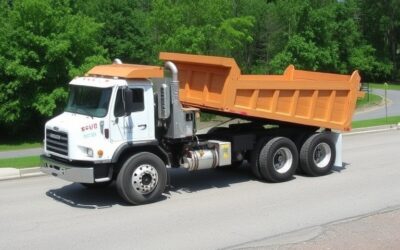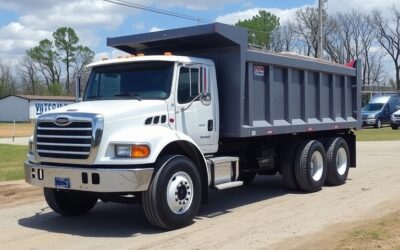Safety and stability are crucial when it comes to operating dump trucks. These heavy-duty workhorses transport massive loads but also carry risks that can lead to accidents if not properly managed. Ensuring the stability of your dump truck is crucial not just for the safety of the driver but also for the efficiency and reliability of operations.
Essential Practices for Dump Truck Stability
Maintaining the stability of a dump truck begins with understanding some basic principles and implementing key practices. Here are some essential practices to keep your dump truck stable:
- Proper Load Distribution: A key factor in dump truck stability is even load distribution. Uneven loads make the truck unbalanced, raising the risk of tipping. When loading, always make sure that the weight is spread out evenly across the bed of the truck.
- Use of Restraint Systems: Use tarps, ropes, or straps to secure your load, preventing dangerous shifts during transit. Load movements can create unstable conditions, especially when the truck is navigating turns or uneven terrain.
- Operating on Level Ground: Whenever possible, operate the dump truck on level ground. Tipping risks increase significantly when operating on slopes or uneven surfaces. If you must dump on an incline, position the truck facing downhill and keep the bed as low as possible.
- Controlled Unloading: When unloading, lift the truck bed slowly and smoothly—sudden movements can cause instability. Always ensure the area is free of obstructions and that the surface is stable. Avoid unloading in high winds, as this can affect the balance of the load.
By following these practices, you can maintain the stability of your dump truck, reducing the risks of accidents and ensuring safer operations.
Implementing Advanced Safety Technologies
Modern dump trucks can benefit greatly from advanced safety technologies designed to prevent tipping and enhance overall stability. Here are some of the most effective technologies to consider:
- Anti-Tip Devices: Anti-tip devices monitor and adjust your truck’s stability, preventing dangerous tip-overs. These systems use sensors to detect if the truck is tilting and automatically trigger mechanisms to lower the bed or adjust the load, thus preventing a potential tip-over.
- Stability Control Systems: Similar to those used in other heavy-duty vehicles, stability control systems help manage the truck’s balance. These systems are integrated into the vehicle’s electronic control unit (ECU) and assist in maintaining stability by adjusting speed and braking when necessary.
- Load Measuring Systems: Accurate load measuring systems can prevent overloading, a significant factor in tipping incidents. These systems provide real-time data on the weight being carried, ensuring the truck does not exceed its safe operating capacity.
- Driver Assistance Technologies: Technologies such as cameras, sensors, and alarms can alert drivers to potential hazards. Collision avoidance systems and lane departure warnings can help drivers navigate safely, especially in challenging conditions.
- Telematics and Monitoring: Telematics systems provide comprehensive data on the truck’s performance and stability. These systems can track real-time metrics such as speed, load weight, and tilt angles, allowing for better management and quick response to any issues.
By integrating these advanced safety technologies into dump truck operations, companies can significantly reduce the risk of accidents and enhance overall safety. These technologies offer real-time solutions and proactive measures that ensure dump trucks remain stable, even under challenging conditions.
Regular Maintenance and Inspection Tips
Routine maintenance and thorough inspections are essential to ensuring the stability and safety of dump trucks. Here are some key tips for keeping your dump truck in top condition:
- Scheduled Inspections: Schedule regular inspections to spot wear and tear on crucial parts like the hydraulic system, tires, and suspension. Addressing issues early can prevent larger problems and potential accidents.
- Hydraulic System Checks: The hydraulic system is crucial for the operation of the dump bed. Check for leaks, proper fluid levels, and smooth operation. Any irregularities should be addressed immediately to avoid sudden failures.
- Tire Maintenance: Tires play a significant role in maintaining stability. Inspect tires for proper inflation, tread wear, and overall condition. Uneven tire wear can indicate alignment issues that need to be fixed to maintain balance and ensure safe operation.
- Chassis and Frame Inspections: Regularly examine the chassis and frame for any signs of damage or stress. Cracks or corrosion can compromise the structural integrity of the dump truck and increase tipping risks.
- Safety Device Functionality: Ensure all safety devices, including anti-tip systems and stability control systems, are functioning correctly. Regular software updates and calibration checks can keep these devices working efficiently.
- Brake System Checks: Continuously monitor the brake system for wear and ensure it is functioning properly. Effective brakes are essential for maintaining control, especially under heavy loads.
By adhering to a rigorous maintenance schedule and conducting regular inspections, you can ensure that your dump truck remains stable and safe for all operations.
Best Operational Practices for Truck Drivers
Truck drivers play a crucial role in maintaining the stability and safety of dump trucks. By following these best operational practices, drivers can minimize risks and enhance safety.
- Training and Education: Ensure all drivers are adequately trained in operating dump trucks and understanding the specific risks involved. Regular training updates help keep drivers informed about new safety protocols and technologies.
- Pre-Trip Inspections: Perform thorough pre-trip inspections to check for any potential issues. This includes examining tires, brakes, hydraulic systems, and load security. Identifying and addressing problems before hitting the road can prevent accidents.
- Speed Management: Maintain appropriate speeds, especially when carrying heavy loads or navigating turns. High speeds can increase the risk of tipping, particularly on uneven terrain or when making sudden movements.
- Awareness of Surroundings: Drivers should always remain aware of their surroundings, including road conditions, weather, and other vehicles. Keeping an eye out for potential hazards can help in making timely adjustments to maintain stability.
- Proper Load Handling: Follow best practices for load handling, such as ensuring even distribution and securing the load with restraints. Avoid overloading the truck beyond its capacity to maintain balance and prevent mechanical stress.
- Safe Unloading Practices: When unloading, drivers should do so on stable, level ground and raise the bed slowly. Quick or jerky movements can destabilize the truck, increasing the tipping risk.
By adhering to these best operational practices, truck drivers can significantly reduce the risks associated with dump truck operations, ensuring safer and more efficient performances.
Conclusion
Keeping your dump truck stable and safe requires a multifaceted approach that includes essential practices, advanced safety technologies, regular maintenance, and adherence to best operational practices. Focusing on even load distribution, using modern safety devices, and keeping up with routine checks boosts both truck safety and driver confidence.
Drivers hold a vital role in maintaining stability through diligent practice and awareness. Their commitment to safety protocols and continuous learning is key to reducing accidents and boosting operational efficiency. Regular training and education ensure drivers are equipped with the latest knowledge and skills to handle these heavy-duty vehicles effectively.
To get the most out of your dump truck operations and ensure top-notch safety and stability, consider integrating advanced anti-tip technologies and maintaining a strict maintenance routine. Remember, a stable and safe dump truck operation is not just beneficial for productivity but also crucial for the well-being of everyone involved.
For more information on how you can equip your dump trucks with the best anti-tip technologies, visit Wink Anti Tip today. Ensure your trucks are operating at their safest with our advanced solutions.





